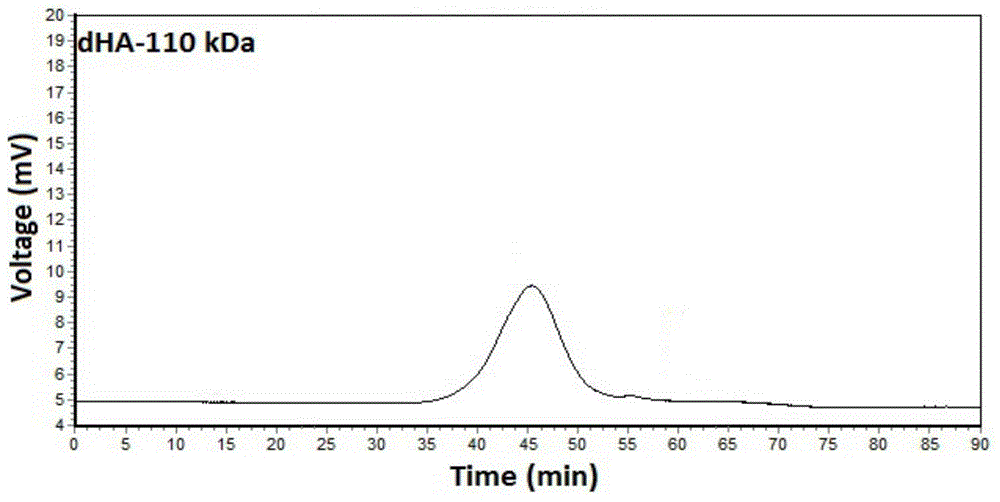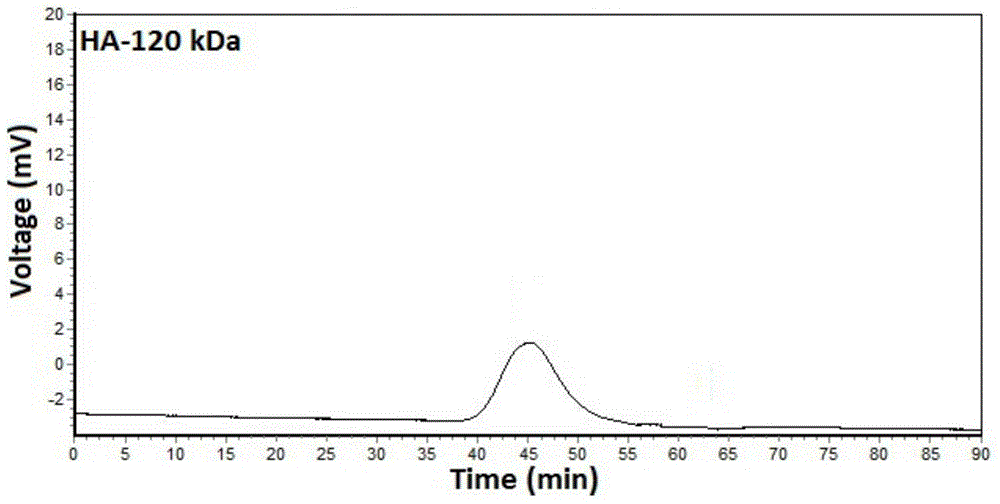Preparation method and application of high-molecular-weight deacetylated hyaluronic acid
A technology of hyaluronic acid and high molecular weight, which is applied in the field of polysaccharide modification, can solve the problems of glycosidic bond breakage, hydrazine hydrate deacetylation effect is not very ideal, and can not achieve good deacetylation effect, etc. It takes a short time to achieve and is easy to operate Effect
- Summary
- Abstract
- Description
- Claims
- Application Information
AI Technical Summary
Problems solved by technology
Method used
Image
Examples
Embodiment 1
[0030] The preparation of embodiment 1 high molecular weight deacetylated hyaluronic acid
[0031] like figure 1 As shown, a kind of preparation method of high molecular weight deacetylated polysaccharide specifically comprises the following steps:
[0032] 1) Preparation of anhydrous hydrazine: add 12 g of potassium hydroxide to 30 mL of hydrazine monohydrate, overnight at 4°C, take the supernatant, add 12 g of sodium hydroxide, protect with nitrogen, heat under reflux for 2 hours, change to a distillation apparatus, and collect the distillate , to obtain 90-94% of anhydrous hydrazine.
[0033] 2) Dissolving hyaluronic acid with anhydrous hydrazine containing 1% hydrazine sulfate by weight, and reacting at 60°C for 72h after deoxygenation nitrogen protection;
[0034] 3) The reaction product was precipitated with cold ethanol, the precipitate was dissolved in glacial acetic acid with a concentration of 5%, iodic acid with a concentration of 5g / L was added, and it was placed...
Embodiment 2
[0037] Example 2 Proliferation of polysaccharide spleen lymphocytes
[0038] 1) Acquisition of splenic lymphocytes: Take 5 B6 mice, kill them with nitrogen, soak them in 70% alcohol for 10 minutes, open the abdominal cavity of the mice under aseptic conditions to take the spleens, grind them through a 70-micron mesh with the inner core of a syringe, PBS The spleen cell suspension was collected and divided into five tubes, centrifuged at 1000 r / min for 5 min, and the supernatant was discarded. Add 12 mL of ammonium chloride erythrocyte lysate to each centrifuge tube, mix spleen cells evenly, let stand for 5-6 min, until the erythrocytes are completely broken, centrifuge at 1000 r / min for 5 min, discard the supernatant to remove the erythrocytes, wash 1-2 times with PBS, and rinse with RPMI -1640 (containing 10% fetal bovine serum) to resuspend the cells, count and adjust the cell concentration to 8-10×10 6 pcs / mL;
[0039] 2) Drug-stimulated splenocyte proliferation experimen...
Embodiment 3
[0042] Example 3 Using TLR2- / - and TLR4- / - deficient mice to do splenocyte proliferation experiment
[0043] 1) The acquisition of spleen lymphocytes was the same as that in Example 2, and the spleen cells of TLR2- / - and TLR4- / - and their control mice B6 and B10 were obtained respectively;
[0044] 2) drug-stimulated splenocyte proliferation experiment: the same as in Example 2, plating, adding drugs, culturing, and detecting;
[0045] 3) According to the absorbance plot, calculate the proliferation rate, and compare whether the proliferation effect of the drug on splenocytes depends on the TLR2 or TLR4 pathway, such as Figure 5 As shown, the results show that the proliferation of splenic lymphocytes by HA-72 is dependent on the TLR4 pathway, whereas the proliferation of splenic lymphocytes by dHA-72 is dependent on the TLR2 pathway.
PUM
 Login to View More
Login to View More Abstract
Description
Claims
Application Information
 Login to View More
Login to View More - R&D
- Intellectual Property
- Life Sciences
- Materials
- Tech Scout
- Unparalleled Data Quality
- Higher Quality Content
- 60% Fewer Hallucinations
Browse by: Latest US Patents, China's latest patents, Technical Efficacy Thesaurus, Application Domain, Technology Topic, Popular Technical Reports.
© 2025 PatSnap. All rights reserved.Legal|Privacy policy|Modern Slavery Act Transparency Statement|Sitemap|About US| Contact US: help@patsnap.com



